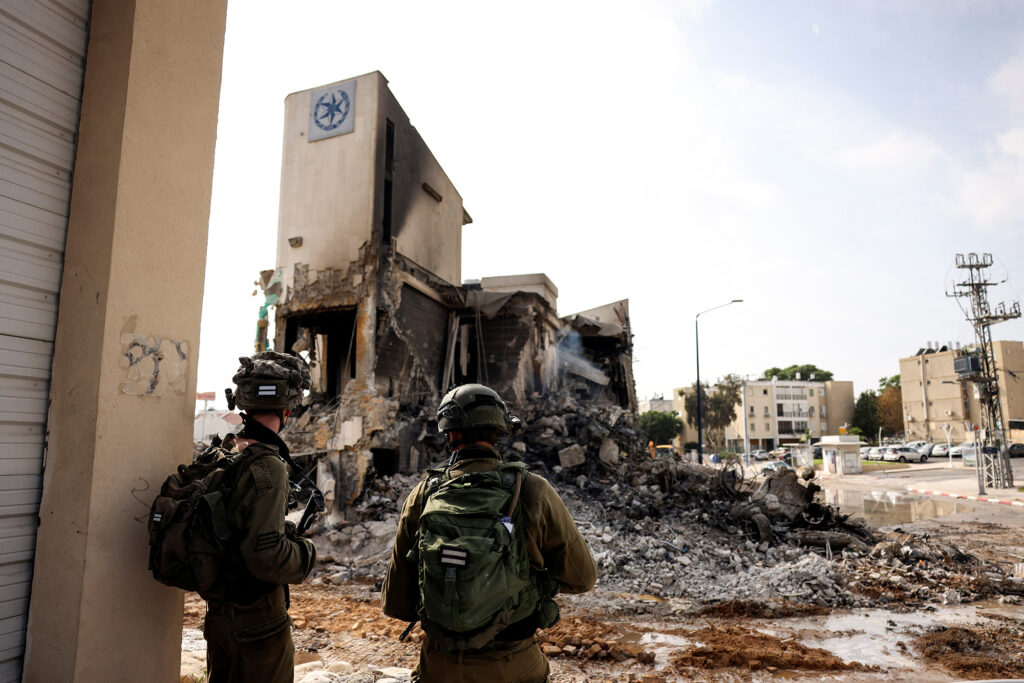The recent attacks on Israeli civilians by Hamas, leaving at least 900 people dead, and a staggering 2,500 wounded or kidnapped, has sent shockwaves across the globe. According to business leaders on the ground in Tel Aviv and elsewhere, the insurance industry is in a race to support stricken Israelis in their time of need.
Today is the first day after the attacks, that companies have properly reopened, and insurance leaders are now addressing the urgent demand for assistance in several areas. No official figures currently exist in terms of damage assessment. According to the Global Trade Research Initiative, Indian exporters could face higher risk premiums and shipping costs, eroding their profit, but trade volumes will not get impacted unless the war escalates.
CNN said that global oil prices climbed 4% on Monday over fears that the unprecedented weekend attack could escalate into a regional conflict embroiling oil-producing nations. The latest reports suggest military operations have brought the situation under control, as Israel said on Tuesday it has re-established control over the Gaza border and was planting mines where Hamas militants had toppled the barrier during their bloody weekend assault, after another night of relentless Israeli air raids on the enclave.
Speaking to Insurtech Insights from Tel Aviv, Kobi Bendelak, CEO of Insurtech Israel, explained the on-the-ground situation, saying there were both short and long-term considerations for the insurance industry, but that companies had reacted with impressive swiftness to cope with the attack’s aftermath.
He said: “We have some urgent things to take care of and some long-term issues. The short term goal is to assist Israelis that are abroad – to extend travel insurance, to engage with the problems of flight cancellations and medical services around the world. Based on the situation, many Israelis have decided to come back home sooner than they expected. So, insurance companies have opened emergency help desks and are extending automatically, those policies that are required in these times”
Israel’s insurance providers working with Government to rebuild and assess damage
By Israeli law, all damages caused by political conflict are covered by the Government – which works with the insurance industry to address damage to property, and to assist with assessments being carried out. Bendelak explained that though there are challenges, mainly stemming from the increased rate of the US Dollar, heavy government investment across the insurance sectors, has meant that many measures to stabilise communities afflicted by the attacks, are already being rolled out.
Israel launched a nationwide shutdown of businesses upon news of the attacks on Saturday, but the country began to reopen yesterday. Describing the unfolding situation, Bendelak said: “It [business] hasn’t come to a sudden halt; it’s more like the situation during the COVID pandemic. We’ve transitioned to remote work from home. Naturally, the majority of our workforce is now operating remotely. While it poses some challenges, we’re equipped to handle them thanks to past experiences with similar events.”
Insurtechs in Israel rally their staff and remain positive
His sentiments echoed those of other insurtech business leaders with operations in Israel and beyond. Tomer Kashi, CEO and Founder of Voom, penned a long message of support to all his staff, urging them to take off any time they needed, and assuring them of the company’s concern for their wellbeing, while adding some perspective.
He said, “… the growing stories of tragedy, miracles, and near-death experiences involving acquaintances and distant relatives are deeply disturbing and unsettling for us all. While we recognise the magnitude of this national tragedy, it is crucial to note that the attack was primarily concentrated in the southern region of Israel. Hence, most of us are safe and in good health. This in no way diminishes the profound impact of what happened, but it is vital to convey that there is no immediate threat to our team members.”
He continued: “ Engaging in positive actions and gradually resuming routines, whether work-related or personal, can offer much-needed stability and comfort. Engaging in conversations, whether related to the incident or not, can also provide significant emotional relief. In terms of work, please take the necessary time to recalibrate.”
David Schapiro, co-founder and CEO of Planck, said his teams were continuing with “business as usual”, and that the event had further mobilised them. “ First and foremost, we are all together now in Israel, working in parallel in our businesses and the defence of our country. As we closely monitor this situation, we will continue business as usual while ensuring our team’s safety.”
Resilience and agility bred in conflict
Israel’s long history of conflict, Schapiro pointed out, has led to businesses always having a sense of preparedness when the worst happens. “These are tough times for us in Israel, but we have a lot of experience in tough times. This work under pressure and perseverance are some of the factors that inspire so much technological innovation in insurance and other sectors, coming out of our country.”
At Planck and all the other Israeli companies I know, we are maintaining secure operations through our on-site and remote setups and are preserving our team’s morale. With confidence in our resilience, I do not foresee long-term effects on the Israeli insurtech or high-tech industry.
David Schapiro, Co-Founder of Planck
Sivan Iram, CEO and Founder of Capitola, which is based in both California and Tel Aviv, said his teams had also adopted alternative working arrangements. He expressed his deep sadness for the attacks, saying: “This act is an affront to humanity, displaying utter callousness and indiscriminate violence. The impact of this Hamas attack has been devastating for Israeli citizens, including our employees, who are part of a tightly-knit community. Many have personal connections to those affected or have loved ones serving on the front lines. We’re supporting our affected employees by temporarily closing the office and offering flexible work arrangements. Regular communication keeps our team informed.”
The long term view for Israel’s insurtechs
While it’s very early days, historical events in the region suggest that this latest attack will not be resolved swiftly, and Israel’s citizens and businesses may face long-term business disruptions and conflict as a result.
The impending war threatens the Israeli economy and startups in the region. It may deter investment, as risk aversion grows, and disrupt daily operations for companies with offices in Israel.
Sivan Iram, CEO and Founder, Capitola
Iram described the geopolitical situation, saying, “The impending war threatens the Israeli economy and startups in the region. It may deter investment, as risk aversion grows, and disrupt daily operations for companies with offices in Israel.”
But, he added: “Despite the darkness, we remain optimistic. Israel is resilient, and unity will prevail. We extend our gratitude to the InsurTech community for their support and call on all startup stakeholders to stand together. Let’s protect our people, our businesses, and our thriving startup ecosystem during this challenging time, ensuring its enduring strength.”
Heavy emotional cost
Bendelak believes the industry will recover fast, even if a conflict is ongoing, which seems likely. But the emotional scarring of such horrific events will be the biggest obstacle to overcome. “Currently, the barriers we face are more emotional than anything else. The pain runs deep, and our hearts are heavy due to the harsh actions of these terrorists. The impact has been severe, and many of us have lost friends or family members to killings or kidnappings. The prevailing feeling in Israel is one of distress and sorrow. As of now, these emotions serve as the primary obstacles.
“Looking ahead, if the conflict persists over the long term, additional challenges may arise. However, until that happens or until I see any other potential hurdles for our companies, I believe our nation and ecosystem are resilient. We’ve faced similar situations before and have the experience to navigate through them swiftly.
“Regarding the duration of the conflict, I don’t foresee a quick resolution. It may take days or even weeks to address the situation adequately.”
“We’re familiar with such situations, equipped with past experiences. Soon, we’ll return not just at 100%, but even stronger. This resilience is what defines Israel as a startup nation, shaping our history. We’ll emerge from this situation and thrive.”
Kobi Bendelak, CEO, Insurtech Israel
He also echoed Iram’s concern that a long-term conflict could potentially inhibit the startup market. “While I’m not entirely certain, I anticipate a gradual slowdown in the startup’s progress following the infusion of funds. This might impact the financial aspect, especially for startups with overseas clients requiring swift adaptation to global shifts.”
However, established insurtechs are agile and confident enough to handle the challenges, said Schapiro, who expressed confidence in the market’s ability to recover and thrive. “At Planck and all the other Israeli companies I know, we are maintaining secure operations through our on-site and remote setups and are preserving our team’s morale. With confidence in our resilience, I do not foresee long-term effects on the Israeli insurtech or high-tech industry,” he concluded.
Gil Arazi, Founder and Managing Director of FinTLV Ventures, expressed his extreme distress at the situation, saying, “This assault, unparalleled in its intensity, has resulted in the tragic loss of many Israeli lives. Hundreds of Israelis have been brutally murdered, and countless children- even babies, women, men, and the elderly have been taken hostage in Gaza, brutally murdered and raped. Every affected individual is someone’s child, sibling, or friend, making the impact of this attack felt deeply and personally across our nation.”
However, he echoed sentiments from his colleagues in the industry, saying: “Throughout Israel’s history, we have navigated numerous crises and challenges. Each time, our spirit of unity, the unwavering capabilities of the Israeli Defense Forces, and the collective resilience of our nation have enabled us to overcome.”
He continued: “Despite the current situation, it’s essential that we continue our commitments to our families, peers, customers, investors and partners. This situation also captures the essence of Israeli entrepreneurship and resilience. Under the current situation, insurance technology companies are working hard to maintain their position and to continue to expand globally and provide global support to their customers.”
Gratitude for international support and a rebuild strategy
Bendelak added that he and his teams had been overwhelmed by the amount of support pouring in globally. He said: “Since Saturday, we’ve been flooded with hundreds of thousands of emails, messages, and calls from friends and even strangers worldwide, extending their support and solidarity. It’s truly unbelievable. People I’ve never met, reaching out through LinkedIn, WhatsApp, SMS, and emails from every corner of the globe. A heartfelt thanks to everyone around the world who’s stood by us and shown incredible solidarity during this challenging time.
“We are committed to giving our best and dispelling any doubts. We won’t just overcome this; we’ll obliterate any notion suggesting otherwise. Firstly, gratitude to all those supporting us globally. Secondly, we eagerly anticipate reengaging with the insurance industry worldwide, and we’re set to do so swiftly, possibly in the coming days.”
He concluded: “We’re familiar with such situations, equipped with past experiences. Soon, we’ll return not just at 100%, but even stronger. This resilience is what defines Israel as a startup nation, shaping our history. We’ll emerge from this situation and thrive.”
Author: Joanna England








